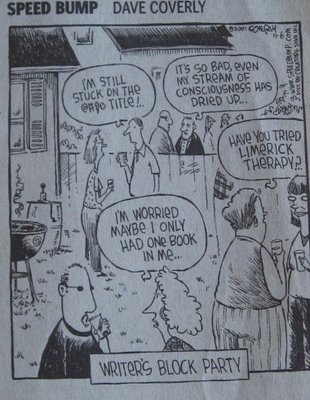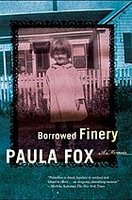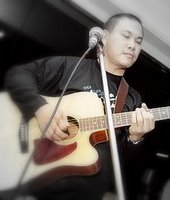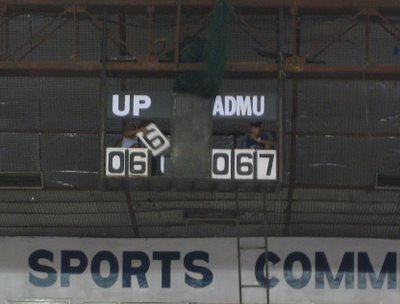What does it profit a man if he gains the entire game, but suffers the loss of his soul to Binondo?
As I write this, the UP Fighting Maroons has just struggled, laboriously, from a 16-point deficit with the FEU Tamaraws, evening out at 63-63 in the beginning of the second half. TV commentator TJ Manotoc says that it was an "uphill climb" for this "undersize team."
I do not know how this game will end. But I know one thing: I am getting tired of two "in spite of's" that plague the team. Not its small size, for that cannot be helped and the boys fight as if this is of no matter. Not its youth and inexperience, for these too cannot be helped and in some ways can work for the team.
What really vex me are the inefficient, almost manipulative refereeing and the specter of Binondo eating away at college basketball.
There are way too many examples of appalling refereeing and sadly, whether by chance or choice, most of these against UP. I watched, aghast, when in the last seconds of the game against Ateneo, the referee suddenly called a technical on UP’s Marvin Cruz for delaying the game when he tapped the ball from Kramer, giving Ateneo two free throws and ball possession. Whaaa??? Marvin’s violation was his first, which meant he should get only a warning, not a technical. The other delay on UP was slapped on the bench, and hence cannot be counted on Marvin Cruz. The technical on him was heinous: it turned the tide in favor of the Blue Eagles, as did the other stupefying calls.
Worse, in the last 21 seconds of the UP-Adamson game last Sunday, with the Falcons a mere one point ahead of UP and the Maroons with the last ball possession, the referee suddenly called an atrocious backing violation against Marvin Cruz. Whaaa??? In the repeated replays we watched, The Coach and I saw how firmly Marvin settled his foot on the backcourt waaaay before the ball reached his hands. There was no mistaking it. Immediately after the game, The Coach went to the ABS-CBN OB-van with UAAP Deputy Commissioner Ato Badolato to show him the absurdity. The Coach knew the technicals of the sport inside out: he himself had been a Deputy Commissioner of the UAAP for three years and had personally trained referees. And Commissioner Ato Badolato agreed: it was clear—there was no such violation. No call should have been made. UP should have been given 21 seconds to shoot what was probably the last ball.
But what to do? Nothing more than to probably suspend the erring referee. No other remedy can be made—for in basketball, as in life, judgment calls, however bad, are part of the game.
That gruesome call likewise decided that game. With all of 21 seconds on the Falcons' side, it could waste the time and retain its one-point lead.
My only consolation is that the Binondo bookies put a +2 margin on UP against the Falcons. But since the Falcons won by only two points, then it meant that the many who bet against UP, given the favorable odds for the Falcons, lost. Nasunog is the streetspeak for it. Many of them, hopefully, burned to a crisp.
It is now the last quarter and the Tamaraws has recovered the game, putting a comfortable 12 points. The Maroons put in what the commentators call "impossible shots," narrowing the margin to 8.
I wonder what margin Binondo gave the Maroons in this game against the Tamaraws.
Funny how the margin—a word that can mean the periphery, or blank space, or outskirts—can dictate the outcome of a game. Put enough money on a team, and the referee’s vision dims, everything seen clearly only upon hindsight and frequent replays on the VHS, and probably shelved into the catch-all limbo termed “judgment calls.” Translation: you cannot do anything about it.
It is an affliction that sadly can reach players—professional or amateur—of all teams. Oftentimes players’ shots turn awry without warning, defenses crumble, and balls fly out of the court. Five years in the PBA and MBA trained The Coach’s eye to spot dead-on when any player fools around: The Coach can map out a player’s tendencies, whether he favors his left or his right, the best way to defend him, how he takes his first step and how quick it is, his release of the ball, and if he fakes before a lay-up. A player works his body into a routine, his limbs falling into its natural rhythms. It would be against the laws of his body to suddenly fumble, against his nature to change in mid-game the release of his ball. Years ago when I would sit with The Coach when he was breaking a game down to a player’s specifics, I would hear him mutter, “Mahirap magbobo-bobohan ang matalino.”
How has the long arm of Binondo reached the UAAP? When the Metropolitan Basketball Association (MBA) burst into the scene in the late 90s and even when it petered out years later, it ate into the PBA market, which, despite furious beefing up of its ranks by recruiting Fil-Ams and Fil-Shams, barely recovered. The entry of the NBA and the U.S. NCAA into our cable TV—with their flashier, better play—dug deep into the PBA’s Achilles heel. With the public’s dwindling interest in the PBA and a redirected televised attention to college basketball, Binondo turned its eye on the more profitable UAAP.
Remember the gambling scandal unearthed about two years ago in the universities? The papers reported the massive betting made by students, from grade school to college, resulting in bookies hustling after the young ones for lost and unpaid hundreds of thousands, interest compounding. This hasn’t abated, only hushed. My friend who has a grade schooler in Ateneo said some kids still pool their money together to buy the minimum P500 bet.
Executives of a Makati bank, of which I used to be a retained counsel, would bet even on teams of which they are not alums. They would place their bets on the phone, keeping an eye on a TV set turned surreptitiously to Studio 23, while the other sets rightfully monitored the stock market and the ANC channel.
The Coach himself, when he was a Deputy Commissioner, was not spared from the tentacles of betting. When he and the other commissioners chose the referees of every game, they had to resort to an almost cloak-and-dagger system: they would call in several referees to suit up, confine them to an undisclosed room, confiscate their cell phones, and in the last minutes before a game actually starts, conduct a raffle to determine which three referees will call the game. The three are kept closeted by the commissioners while The Coach would explain to them the plays of the competing schools, as well as players’ tendencies, so they would reduce any judgment calls. In this manner the Dark Force would be hard put to invest its money on any one referee. Still, some shady characters, as well as a few school or team officials, would attempt to penetrate the raffle. How distressing that the “play” part of college ball, the part which should celebrate the game and the university, is being infected, insidiously, by big business.
Sometime into the season when he was still a Deputy Commissioner, The Coach changed his cell phone number, the only time he did so, so he could avoid calls that would only cloud his judgment. He and I prayed for God’s grace to help him all throughout. It was not easy for him and the other commissioners: juggling complaints on one side, monitoring the refereeing and staving off Binondo, which at one time plunked over P150 million on an Ateneo-DLSU game.
There. The Tamaraws just won by 8 points over my boys. My heart sinks. The commentators say that the eight rookies of UP will spell a “scary team” in the years to come. It is of little comfort to me.
I wonder: as Coach Joe Lipa talks to his boys, how will he encourage them? How will he tell them to continue to fight a good fight, in spite of? They only want to play: this is a game they love, sometimes even beyond school.
I wish Binondo would just let them play.
This, above all:
This, above all: To be God's best for The Coach and for Anna
Sunday, July 30, 2006
Friday, July 28, 2006
Faith, love, time and my friend SN
My friend SN was in a spiritual funk, a path I’ve been on several times. I’d like to share portions of what I wrote her, rewritten to suit this space.
Dear SN,
I'm sorry to hear you feel like you're "away" from God. Perhaps there are some things in your life you need to sort out. Our relationship with God is sometimes affected, strongly, by our relationship with our earth fathers and mothers. The father and mother wounds we have dictate how we see, appreciate and deal with God the Father.
Don't worry about not being "diligent." Our relationship with God is not a set of do's and don'ts—reading the Bible, praying, reaching out, etc.—no, never like that. Ours is really a relationship: dealing, talking, searching, hurting, processing, understanding. We deal with God out of the overflow of our hearts as to what He has done for such as unworthy as we.
Sometimes what we lack is awe, for a love as unfathomable as His.
And we lack reverential fear, at what He is and what He can do.
The world is too loud: it drowns out His still, small voice. But do not ever think that the God of the Old Testament has changed: He's still the same—powerful, majestic, holy. God of the OT flexes a muscle and the man holding the ark dies. He speaks, and a world is formed. This world that chooses to hurt Him so, He can wipe off the universe with a single word, a thought. But He chooses to love us gently, inspite of.
Reading His Word is just like wanting to hear a beloved's voice. Approach it that way. Know that the author wrote it for you, you whom He formed with such care, attention and love.
The Lord is a big guy. He can take all your ranting, and not blink. I've had numerous occasions to just rail at Him, to wrestle with Him, but He knows me so well, as He should—He made me, after all—and what I do doesn't surprise Him. But what I do can hurt Him, grieve Him.
When I run away from Him, it is not so much that He gets angry or wrathful and brings the heavens down on me (as He could, but doesn't), but it's more that He gets grieved at the willful rejection. Like we would, if we were to be rejected.
God is a loving Father and desires no more than to be yours. For us He made an entire world, and peopled it for us. What we do—fellowship, worship, quiet time, prayer—is really just our response to Him. It is not borne out of guilt or duty, but of love.
Ours is a heart-to-heart relationship, a spirit calling out to a Spirit. God always looks to the heart, not to the letter of the law. My prayer is that you would really hear Him speak to you, to encounter Him in fresh, new ways that will make your relationship with Him flower and just come alive, that you would be so sensitive to Him that you would hear Him, always, on the street, while you work, as you sleep.
Love,
J
Tuesday, July 25, 2006
From the Happy Box, #1
I keep three Happy Boxes (and may need to set up one more), each storing whatnots that make me happy or remind me of happy times. Stuff like the sand dollar my friend/poet Jeneen found in Bais, Negros in our weekend break from the 2001 Dumaguete workshop, or the 1986 ticket to the UP-FEU championship game that UP won (The Coach bought that ticket for me in the heady first year of our romance), and my first passport issued in 1991.
Good for the soul. And for remembering how incredibly the Lord has blessed The Coach and me through the years, how faithful He has been.
I saw this strip in one of the Boxes. Yes, humor abounds even in the worst of a writer's times. Hee. Laughter is so good. I wish you a belly-aching laugh, at least once this week.

Good for the soul. And for remembering how incredibly the Lord has blessed The Coach and me through the years, how faithful He has been.
I saw this strip in one of the Boxes. Yes, humor abounds even in the worst of a writer's times. Hee. Laughter is so good. I wish you a belly-aching laugh, at least once this week.

Sunday, July 23, 2006
Over the rainbow
My flight home to Cebu last June rocked. Literally. Turbulence shook the plane and rain spattered the windows.
But not before I caught a rainbow in living color.
If you'll look closely, you'll discover another rainbow to the left, a faint echo of its more vivid cousin, diffused by the clouds and rainshowers.
Glorious.


But not before I caught a rainbow in living color.
If you'll look closely, you'll discover another rainbow to the left, a faint echo of its more vivid cousin, diffused by the clouds and rainshowers.
Glorious.


Left and Write
Two nights ago The Coach grumbled as he tap-tapped on Samwise, our iBook. “Janet, where are the letters!?!” he reproached me, as if I was singularly responsible for the loss.
I am. Some of the letters, see, I have wiped off the keyboard in my earnestness, and The Coach—whose post-World Cup/NCAA relationship with Samwise is mostly limited to checking peyups.com or if Championship Productions slashed the prices of its coaching videos—needs the letters to navigate his way around the Web.
My experience with the keyboard was different. Like the many among you who spend dedicated time on the computer, I hardly look at the keyboard; my fingers fly over the QWERTYs as I write. Some time ago, whenever I needed to encode the phrase left and right, I ended up writing left and write. Thrice. Whoa. Samwise the Wise uprears: You, who want to be a writer, write!
Yessir.
As for The Coach’s woes, gee. Help? Are there letters I can buy and stick on the keyboard?
Will bug the trusty Adel Gabot, Mobile Philippines editor and certified MacMan, as soon as he comes back from his well-deserved honeymoon.
I am. Some of the letters, see, I have wiped off the keyboard in my earnestness, and The Coach—whose post-World Cup/NCAA relationship with Samwise is mostly limited to checking peyups.com or if Championship Productions slashed the prices of its coaching videos—needs the letters to navigate his way around the Web.
My experience with the keyboard was different. Like the many among you who spend dedicated time on the computer, I hardly look at the keyboard; my fingers fly over the QWERTYs as I write. Some time ago, whenever I needed to encode the phrase left and right, I ended up writing left and write. Thrice. Whoa. Samwise the Wise uprears: You, who want to be a writer, write!
Yessir.
As for The Coach’s woes, gee. Help? Are there letters I can buy and stick on the keyboard?
Will bug the trusty Adel Gabot, Mobile Philippines editor and certified MacMan, as soon as he comes back from his well-deserved honeymoon.
Friday, July 21, 2006
From our shelf: Borrowed Finery
 Do not read Borrowed Finery like I did: in spurts, while waiting for the elevator or lining up to file our tax return. This book needs to be savored and draw in, like clear morning sunshine or sea breeze. Not that Paula Fox’s memoir reveals a life free of wounds, for there are many of these, more than a young girl’s fair share, no matter how precocious she is.
Do not read Borrowed Finery like I did: in spurts, while waiting for the elevator or lining up to file our tax return. This book needs to be savored and draw in, like clear morning sunshine or sea breeze. Not that Paula Fox’s memoir reveals a life free of wounds, for there are many of these, more than a young girl’s fair share, no matter how precocious she is.Paula approaches her past with the same intelligence and sensitivity she employs in her writing. The almost disjointed telling highlights her life as a giveaway child, shuttled from one place to another, as far as Cuba, where there ''was no one who said [her] name for hours at a time.'' Her spare prose does not hold back; it pierces in its quietness, free of judgment or reservation, unabashed. I recoil at the emotional roulette she suffered in the hands of her parents-playing-at-being-parents, easing only when Paula’s humor cuts in, thankfully, as it frequently does.
I love her Uncle Elwood, a minister, the father many of us would wish we had, who took “thinking walks,” who read to her and surrounded her with books, who took her to the grave of Mark Twain, and to the house of Washington Irving to exorcise her fear of the headless horseman.
Though I was bewildered at the sudden fast-forward to the time Paula meets the daughter she put up for adoption, I was quieted by the shades of hope and healing in the memoir’s closing moments. More of that light, please, for Paula Fox, now 78 and discovered and celebrated anew by the literary community.
Some of the luminous lines I enjoyed. There are many more for you to unearth.
Time was long in those days, without measure. I marched through the mornings as if there was nothing behind me or in front of me, and all I carried, lightly, was the present, a moment without end....
After downing a few drinks, [my father] would fail in love with his own voice, theatrically honeyed, filled with significant whispers and pauses. He was in thrall to his voice; his thoughts stumbled behind....
Could you escape from a divorce the way you could from a marriage? Was it possible to get a divorce from a divorce?...
I grasped consciously for an instant what had been implicit in every aspect of daily life with Uncle Elwood—that everything counted and that a word spoken as meant contained a mysterious energy that could awaken thought and feeling in both speaker and listener.
* Thank you, dear Polymath, for giving me this book. Your giving was unexpected, and all the more charming and precious for that.
Twilight, Shmilight
 My friend, Jon, an editor and a guitar artist now based in Davao, is my keeper when it comes to the English language. It is he who spars with me about words: how healthful—not healthy—should be used in describing options or food, why a rebel who returns to the fold is called a returnee, not a returner, and what is the impact of impact.
My friend, Jon, an editor and a guitar artist now based in Davao, is my keeper when it comes to the English language. It is he who spars with me about words: how healthful—not healthy—should be used in describing options or food, why a rebel who returns to the fold is called a returnee, not a returner, and what is the impact of impact.A few weeks ago I emailed him something about twilight, and, true to form, he asked if I was maybe referring to dusk, which question sent us both running to Wikipedia. And found us these:
Sunset, also called sundown in some American English dialects, is the time at which the Sun disappears below the horizon in the west. It should not be confused with dusk, which is the point at which darkness falls, some time after the beginning of twilight when the Sun itself sets.
Dusk should not be confused with sunset, which is the moment when the trailing edge of the Sun itself sinks below the horizon.
Twilight is the time before sunrise or after sunset when sunlight scattered in the upper atmosphere illuminates the lower atmosphere and the surface of the Earth.
So: it is sunset when the edge of the sun hits the horizon, dusk when the sun has gone below the horizon but before the sky becomes dark, and twilight is just after sunset or before dawn when the sun is below the horizon.
 Coolness. Now that we got that straight, I can now say with all intellectual honesty and accuracy that I come alive at dusk: this kind of dusk that falls outside our window. Fiery. The reds go into my bloodstream and wake me up.
Coolness. Now that we got that straight, I can now say with all intellectual honesty and accuracy that I come alive at dusk: this kind of dusk that falls outside our window. Fiery. The reds go into my bloodstream and wake me up.I’m like a vampire, a term Jon uses loosely around me. I agree, even when some of my diver friends tag me a “child of the sun.” What the heck: I am sleepy in the mornings and half-awake in the afternoons.
Good morning, folks. It’s midnight.
Happy spiritual birthday, Jon. The memory of that walk we three shared 23 years ago--you, me, the Lord--remains fresh, whole, beautiful. I love you,my dearest brother.
Thursday, July 20, 2006
Morning has broken
 When I was told years ago that marriage would turn my life upside-down, I didn't think it would mean this: that we'd sleep at 6 in the morning every day and wake up at 2 in the afternoon.
When I was told years ago that marriage would turn my life upside-down, I didn't think it would mean this: that we'd sleep at 6 in the morning every day and wake up at 2 in the afternoon.That is our schedule these days, what with The Coach’s mandatory night shift at Air 21 so he can cope with his UP and St Stephen coaching duties in the afternoons.
And this is the view that greets us before we sleep in the wee hours.
Tuesday, July 18, 2006
Battle of the Katipuneros
 My two beloved alma maters slugged it out at the Ninoy Aquino stadium last Sunday. Either way I'd win. But when it comes to the hardcourt, I'm a Maroon. (I'm an Eagle only in the moot court.)
My two beloved alma maters slugged it out at the Ninoy Aquino stadium last Sunday. Either way I'd win. But when it comes to the hardcourt, I'm a Maroon. (I'm an Eagle only in the moot court.)I should feel bad we lost. But it's hard to be morose because my boys fought well, as well as they could given the breaks of the game and terrible refereeing (and, no, I'm not just saying that; The Coach just finished splicing the videotapes of the game to ferret out the too many bad calls on UP).
Binondo bettors had given our boys an advantage +4 margin, underscoring yet again the stark 3-inch differential between the two teams. My classmate at the Ateneo nicknamed our team the UP Midgets. He’s an RTC judge: who am I to tell His Honor to get lost?
The refs gave our boys a hard time. We were losing players, fast. Coach Joe Lipa wrung his hands in frustration. “Jerry!” he barked, calling out to the Maroons support staff handing out towels to the players evicted from the game. "Ikaw na nga ang maglaro! Inubos na nila players natin!”
The refs gave Ateneo an all-time high 49 free throws and slammed on UP a record 8 or so calls on traveling. Three or so years ago, DLSU Coach Franz Pumaren stormed the UAAP Commissioner’s office because the refs gave the opposing team 39 free throws—almost statistically improbable. And now the refs gave the Eagles 49 free throws? It meant Ateneo had to work for only a measly 50 points to win.
UP edged out Ateneo in other areas—rebounding, assists, two- and three-pointers. The game, alas, was decided on the free throws.
The Coach is careful not to give in to the conspiracy theories floating about; he’d rather think the refs were simply not trained well, pointing out that there were also a few (only a few!) bad calls on Ateneo. Others, however, unabashedly made connections between the timing and quality of the calls to the +4 betting in Binondo.
The Peyups forum, as expected, is crammed with catcalls and cussing, in which I am tempted to join if not for The Coach’s equanimity about the loss. The Coach knows they still have to work out some of the Maroons’ bad decisions, like not boxing out, and acknowledges the team’s youth. But he is proud of his boys’ hustle, of Galen Cacha, who was just pulled out from the Intrams and started learning how to play only six months ago, yet became a rebounding force. (I think I heard The Coach or someone call him Cacha Gotcha. Never mind that Cacha missed 8 free throws.)
The past two-and-a-half days, The Coach wore down our VHS, playing and rewinding by the microsecond the UP-Ateneo game, checking for flaws in the refereeing, as well in the UP play. I told him my heart was breaking listening to the endless rewinding of our loss, and he said, “Why? We fought a good fight.”
Big hearts, big fight. What more could a fan want?
* Picture of the basketball hoop is not mine. Caught it in one of my trawling trips but, regrettably, can't remember from whose site I borrowed it.
Monday, July 17, 2006
Monday, July 10, 2006
Maroon-ong
The boys were not meant to win. Bookies and bet makers in Binondo heaped on them an advantage +8 points, which means those betting on them would win even if these boys lose the game with not more than an 8-point margin.
Only 4 of the twelve were returning players; the rest were rookies—bright-eyed, skittish, and alternating between excited and nervous. They were a small bunch. When they did the regulatory round robin, they looked puny compared with the UST beanpoles. “Maliit pala tayo, no?” mourned my seatmate, a UP alum. He was perturbed by the two- to three-inch differential between the two squads.
So was I. The UST Tigers were bigger and more athletic, enjoying a deeper bench of 10 veterans: in fact, they were able to substitute an entire platoon in the first half. But I have been a coach’s wife for twelve years to know that the biggest factor in any game is a good coach. And that the Fighting Maroons have: three coaches unafraid to lose their jobs to do what is right.

Under these coaches' care, the boys became steeped in the basics and technicals. They bled Maroon.

The boys suffered first two quarters of bad calls—so bad that in some instances the entire UP bench exploded to their feet, head coach Joe Lipa almost stormed the commissioners’ table, and The Coach stomped to the technical committee with his drill board. But no amount of hairline refereeing could have doused the fires out of the boys.
It was a cardiac game. The first half ended with UP leading by only two points: 45-43.

Which didn’t improve much by the end of the third quarter, with UP just one step ahead at 65-64.

The boys played like they weren’t rookies: Migs de Asis sunk in six triples, and Martin Reyes made four. At one point the UP team that ran the court was composed of four rookies and one sophomore.

The veterans did very well, too: Marvin Cruz—whose first step is quick and explosive—contributed 25 points (his highest in the amateurs, apparently), what with the plays designed for him in the mismatches.

Ira Buyco, my big bald baby, hustled well—which wasn’t limited to the usual rebounding and defending, but also included a stray [but legitimate] elbow here and there. In the game it was to Buyco that the young ones ran to to whine that so-and-so hit him, and Buyco would step up and give that so-and-so a piece of his, well, elbow. Tee hee.
It was pingpong basketball: the Maroons threw a 3-pointer, the Tigers responded. The Tigers sunk in a lay-up, and so did the Maroons. Yet another 3-pointer from the Tigers, and the Maroons followed suit: each side refusing to give in.
In the last two minutes, the score was skewed four points in favor of UP, partly due to the technical slapped on the UST head coach Pido Jarencio who barged into the court.

Which, alas, slipped to an even 92-92 in the final 12 seconds. The game was fast and furious, so much running and gunning. I couldn’t breathe anymore.

I wanted so much for UP to win its first game.
For Coach Joe Lipa, who is The Coach’s mentor, second father and ninong, from whom he inherited the reengineered swearword, “Pongalangala.” (There’s a story behind that. Tell you at another time.) These coaches love UP so much that they work even without pay. In the eight months that The Coach has dashed from his 9PM-5AM FedEx night shift to the 6AM UP practice before stopping for abbreviated sleep and then running to his 5PM St. Stephen basketball practice, UP paid him an allowance only thrice—a pittance not enough to cover his gasoline and food expenses.
But any one who is a purist about basketball knows coaching, like writing, isn’t about the money. It never was. The Coach is never happier than when he teaches college or high school kids who would dive for the ball. College ball is a coach’s game, where skills are taught and strategy pitted against strategy; professional basketball, on the other hand, is more of a players’ game. (Which is why The Coach wasn’t as happy when he did his PBA and MBA stints, though money was abundant. Then.)
Back to the game: UP had the ball in the last 12 seconds, and the score was even-Steven.

In the crucial huddle, Coach Joe directed the boys to spread the offense to give the best offensive player enough space to maneuver, the best being, of course, Marvin Cruz. Marvin dribbled a few precious seconds off the clock (to take the last shot and prevent UST from taking one), ran to the shaded area where three big men were waiting to pounce on him, leapt and shot the ball on a short jumper. It went in! The coliseum erupted in cheers, with less than one second remaining.
The Coach sang “UP Naming Mahal” like he always does—with conviction, even in the odd moments like when we’re in the car or in the house. He has never known another school except UP, he having been trained there since he was five years old.

Outside the Ninoy Aquino stadium, the moon joined the celebration, shining like a pearl.


Later, at the Zong resto at The Fort, the game gets even better in the retelling.

Only 4 of the twelve were returning players; the rest were rookies—bright-eyed, skittish, and alternating between excited and nervous. They were a small bunch. When they did the regulatory round robin, they looked puny compared with the UST beanpoles. “Maliit pala tayo, no?” mourned my seatmate, a UP alum. He was perturbed by the two- to three-inch differential between the two squads.
So was I. The UST Tigers were bigger and more athletic, enjoying a deeper bench of 10 veterans: in fact, they were able to substitute an entire platoon in the first half. But I have been a coach’s wife for twelve years to know that the biggest factor in any game is a good coach. And that the Fighting Maroons have: three coaches unafraid to lose their jobs to do what is right.

Under these coaches' care, the boys became steeped in the basics and technicals. They bled Maroon.

The boys suffered first two quarters of bad calls—so bad that in some instances the entire UP bench exploded to their feet, head coach Joe Lipa almost stormed the commissioners’ table, and The Coach stomped to the technical committee with his drill board. But no amount of hairline refereeing could have doused the fires out of the boys.
It was a cardiac game. The first half ended with UP leading by only two points: 45-43.

Which didn’t improve much by the end of the third quarter, with UP just one step ahead at 65-64.

The boys played like they weren’t rookies: Migs de Asis sunk in six triples, and Martin Reyes made four. At one point the UP team that ran the court was composed of four rookies and one sophomore.

The veterans did very well, too: Marvin Cruz—whose first step is quick and explosive—contributed 25 points (his highest in the amateurs, apparently), what with the plays designed for him in the mismatches.

Ira Buyco, my big bald baby, hustled well—which wasn’t limited to the usual rebounding and defending, but also included a stray [but legitimate] elbow here and there. In the game it was to Buyco that the young ones ran to to whine that so-and-so hit him, and Buyco would step up and give that so-and-so a piece of his, well, elbow. Tee hee.
It was pingpong basketball: the Maroons threw a 3-pointer, the Tigers responded. The Tigers sunk in a lay-up, and so did the Maroons. Yet another 3-pointer from the Tigers, and the Maroons followed suit: each side refusing to give in.
In the last two minutes, the score was skewed four points in favor of UP, partly due to the technical slapped on the UST head coach Pido Jarencio who barged into the court.

Which, alas, slipped to an even 92-92 in the final 12 seconds. The game was fast and furious, so much running and gunning. I couldn’t breathe anymore.

I wanted so much for UP to win its first game.
For Coach Joe Lipa, who is The Coach’s mentor, second father and ninong, from whom he inherited the reengineered swearword, “Pongalangala.” (There’s a story behind that. Tell you at another time.) These coaches love UP so much that they work even without pay. In the eight months that The Coach has dashed from his 9PM-5AM FedEx night shift to the 6AM UP practice before stopping for abbreviated sleep and then running to his 5PM St. Stephen basketball practice, UP paid him an allowance only thrice—a pittance not enough to cover his gasoline and food expenses.
But any one who is a purist about basketball knows coaching, like writing, isn’t about the money. It never was. The Coach is never happier than when he teaches college or high school kids who would dive for the ball. College ball is a coach’s game, where skills are taught and strategy pitted against strategy; professional basketball, on the other hand, is more of a players’ game. (Which is why The Coach wasn’t as happy when he did his PBA and MBA stints, though money was abundant. Then.)
Back to the game: UP had the ball in the last 12 seconds, and the score was even-Steven.

In the crucial huddle, Coach Joe directed the boys to spread the offense to give the best offensive player enough space to maneuver, the best being, of course, Marvin Cruz. Marvin dribbled a few precious seconds off the clock (to take the last shot and prevent UST from taking one), ran to the shaded area where three big men were waiting to pounce on him, leapt and shot the ball on a short jumper. It went in! The coliseum erupted in cheers, with less than one second remaining.
The Coach sang “UP Naming Mahal” like he always does—with conviction, even in the odd moments like when we’re in the car or in the house. He has never known another school except UP, he having been trained there since he was five years old.

Outside the Ninoy Aquino stadium, the moon joined the celebration, shining like a pearl.


Later, at the Zong resto at The Fort, the game gets even better in the retelling.

Saturday, July 08, 2006
Mouse Potato Adventures # 1
When you've got too much housework and so much to shake off from your mind, there's only one reasonable thing to do: reach for the mouse and hop from one site to the other, and you'd discover interesting stuff, like:
- Niche is pronounced as nich or neesh.
- Vincent van Gogh was a pastor's kid.
- Magnatune delivers 60-minute, commercial-free podcasts of Rennaissance music.
- Rubberneck is an intransitive verb that means "to look about, stare, or listen with exaggerated curiosity [e.g., 'Drivers passing the accident slowed down to rubberneck']."
- Claire Messud is beautiful.
- James Joyce's Araby is best read and heard.
Jejune
Oy. Been busy. Massively. Small things, big things, things I should’ve done but didn’t, things I shouldn’t but did. Did invisible writing, read a lot, mostly to get away.
The house looks disheveled, even with the soft lights and dimmers I use to hide the disarray. I let music flood our house. Silence can be cruel; it underscores thoughts unwelcome. So many things happening the past weeks: mostly happy, but some immensely hurtful. And it’s bewildering how the world marches on, remorseless, and doesn’t wait for me to marshal my thoughts, for me to be whole before I, too, move on.
Can’t really bother The Coach right now. His baby, the UP Fighting Maroons, plays its first UAAP game tomorrow. He has other things to mind. Besides, other than listen, there’s not much he can do to help me with my, well, funk. Worse, he might be too cheerful, like he almost always is, with his attitude of gratitude, which I know is true and honest and noble and right—but I don’t want cheer right now. I want to feed this glumness.
The house looks disheveled, even with the soft lights and dimmers I use to hide the disarray. I let music flood our house. Silence can be cruel; it underscores thoughts unwelcome. So many things happening the past weeks: mostly happy, but some immensely hurtful. And it’s bewildering how the world marches on, remorseless, and doesn’t wait for me to marshal my thoughts, for me to be whole before I, too, move on.
Can’t really bother The Coach right now. His baby, the UP Fighting Maroons, plays its first UAAP game tomorrow. He has other things to mind. Besides, other than listen, there’s not much he can do to help me with my, well, funk. Worse, he might be too cheerful, like he almost always is, with his attitude of gratitude, which I know is true and honest and noble and right—but I don’t want cheer right now. I want to feed this glumness.
Subscribe to:
Posts (Atom)

